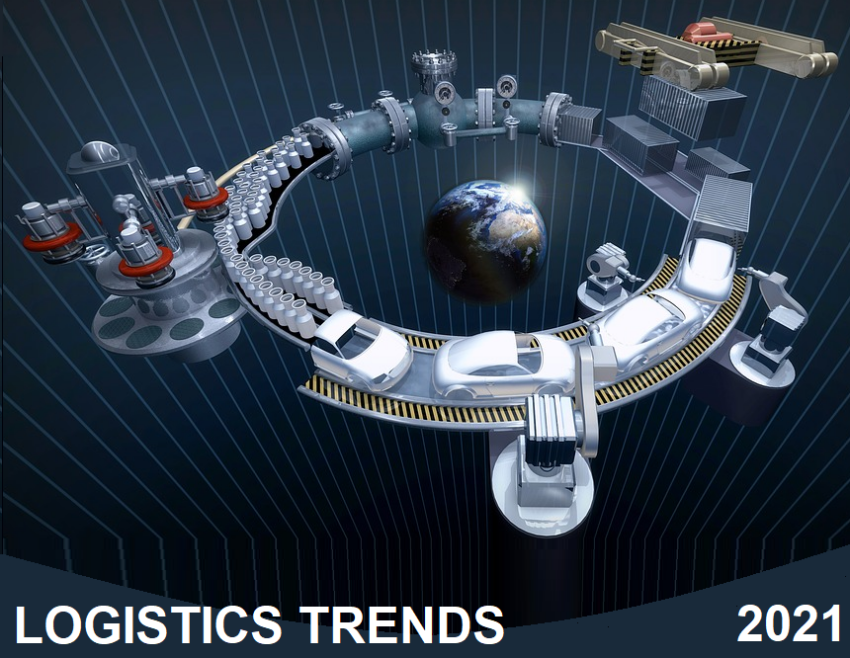The Covid-19 pandemic has simultaneously tested the limits of the logistics industry, highlighted its tremendous contributions to the society, and paved the way for totally new perspectives and objectives for this year. It can be said without a doubt although this industry has discovered the boons of digitization somewhat late, it is finally here and is already making waves in the industry. Especially after the pandemic the supply chain industry is trying to find new, innovative and cost effective ways to reduce the dependency on manual labour and streamline their several operations. This week we will talk about 5 emerging technology trends that are going to impact the logistics industry in 2021.
-
Blockchain
Blockchain which is often referred to as one of the most cutting edge technologies developed in the last couple of years, and in 2021 we will continue to watch tech companies pitching their blockchain solutions for a host of supply chain processes. The use of this technology enhances the traceability of a shipment thereby giving the companies the much needed transparency. Nevertheless, before adopting blockchain, the freight forwarders need to digitize and standardize their data. When implemented in the right way, it will allow the logistics companies to share sensitive data with their suppliers, customers and carriers leading to a transparent and open ledger. The uses of blockchain in our industry are as follows:
- Tracking the exact location of the cargo
- Smart contracts that will make the task of customs clearance and approvals way easier
- Blockchain enabled cold chain solutions for improved temperature control
- Storage and record of all transactions
- Reliable data throughout the supply chain eco system
- Scalable solutions for verification or order tracking
-
Artificial Intelligence
AI has contributed to industry defining innovations in the logistics industry and the use of driverless vehicles, warehouse robots, drone delivery system and smart roads are groundbreaking innovations that are irreversibly going to change the mode of operation of this sector. Companies like Amazon, UPS, DHL etc are tapping into the potential of AI for augmenting their work efficiency and for eliminating human errors. However, it will still take another couple of years for small and mid-sized forwarders to take full advantage of the benefits of AI. Some of the uses of AI in our industry are:
- Warehouse robots
- Supply planning
- Self driving vehicles
- Smart warehousing
- Forecast of demand and planning
- Predictive maintenance
- Route optimization
- Delivery drones
- Customer service chatbots

-
IoT
The IoT or Internet of Things is yet another emerging technology being quickly adopted by the logistics industry. Just like blockchain, this technology also helps to increase transparency in a range of supply chain processes. GPS trackers with IoT enabled sensors when fitted in trucks will offer the advantage of live location tracking. The use of IoT enabled sensors in the warehouse will result in more effective inventory management. Here are some of the uses of IoT in the supply chain:
- Elimination of theft by boosting the security system
- End to end cargo tracking
- Vehicle tracking
- IT security
- Improved safety of workforce
- Driverless vehicles
- Drone deliveries
-
Advanced data analytics
The logistics industry regularly handles a massive amount of data that needs to be organized and stored for further use. Digitization of your data is a complicated process which when done in the right way enormously simplifies your daily tasks and allows for seamless utilization of the available data. Advanced Data Analytics and Predictive Analytics permit the freight forwarders to streamline and update their planning while getting a clear insight into future circumstances. It can help your business in the following manner:
- Workforce management
- Route optimization
- Determination of the peak season
- Identification of supply shortage
-
Wearable gadgets
Wearable gadgets are one of the newly emerging trends in the logistics sector which allows the employees of the logistics firm to straightaway access a wide range of information and enables real-time monitoring of employees. According to DHL who carried out a test run of smart glasses in their warehouse, the wearable devices add value to the logistics industry and results in a 25% efficiency enhancement during the picking process. For instance the reality glass by KiSoft which comes with voice recognition technology and visual prompts and configuration will greatly facilitate warehouse jobs by quick scanning of multiple serial codes. Google Glass is yet another wearable gadget that makes warehouse jobs easier and keeps the hands free of the warehouse employees thereby allowing them to multitask.


